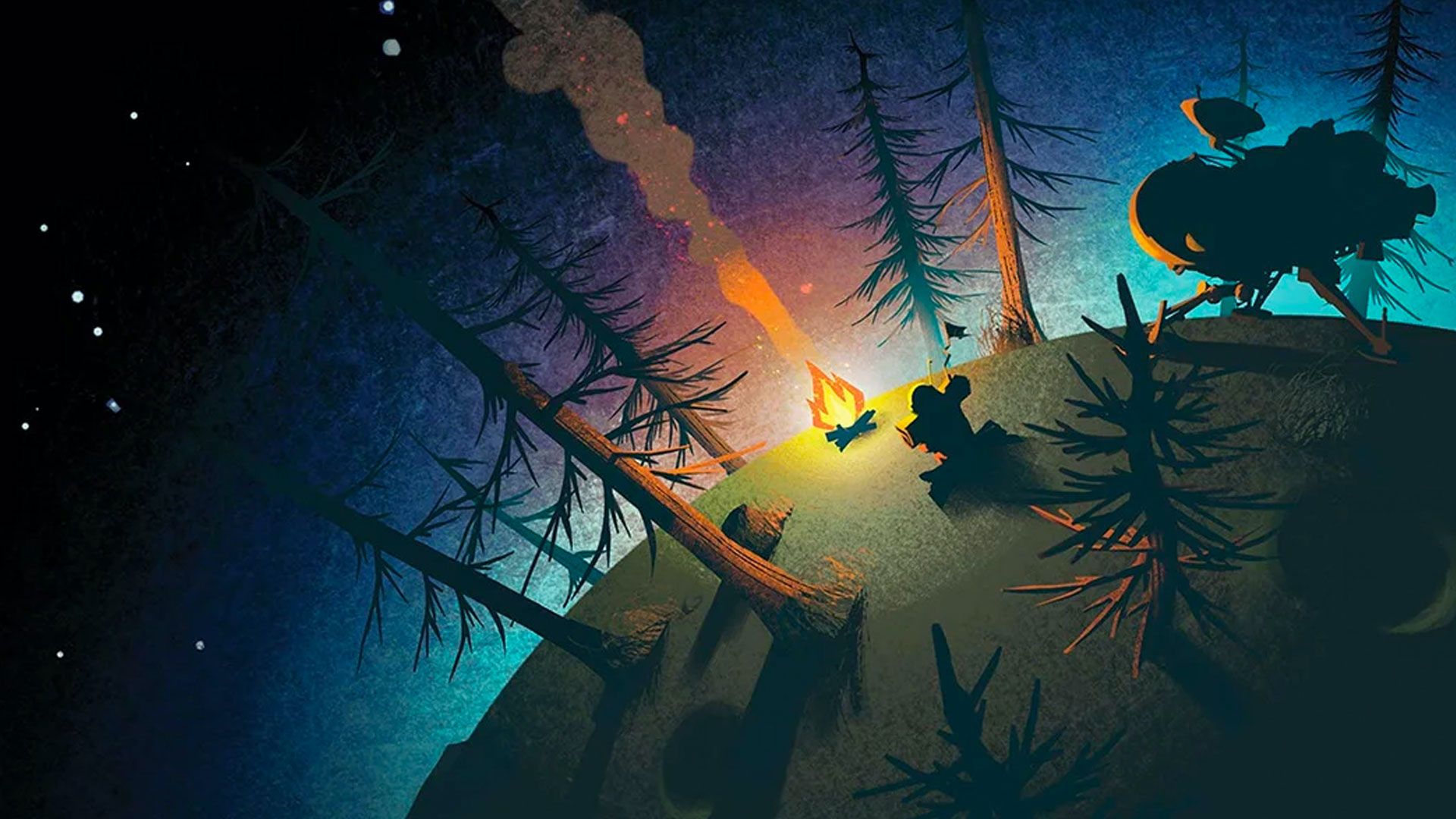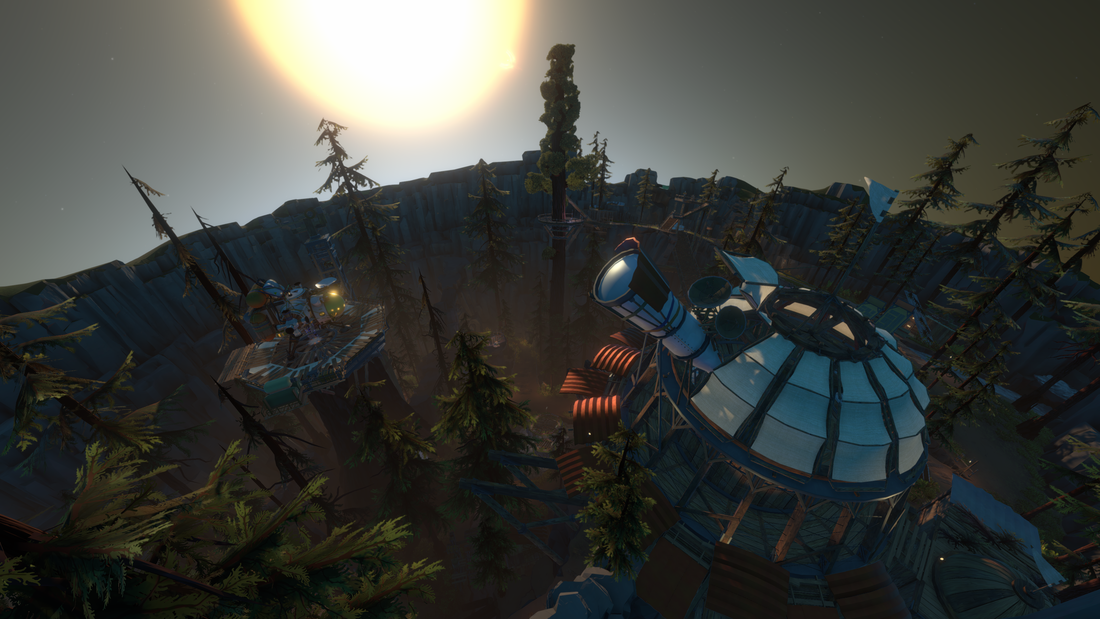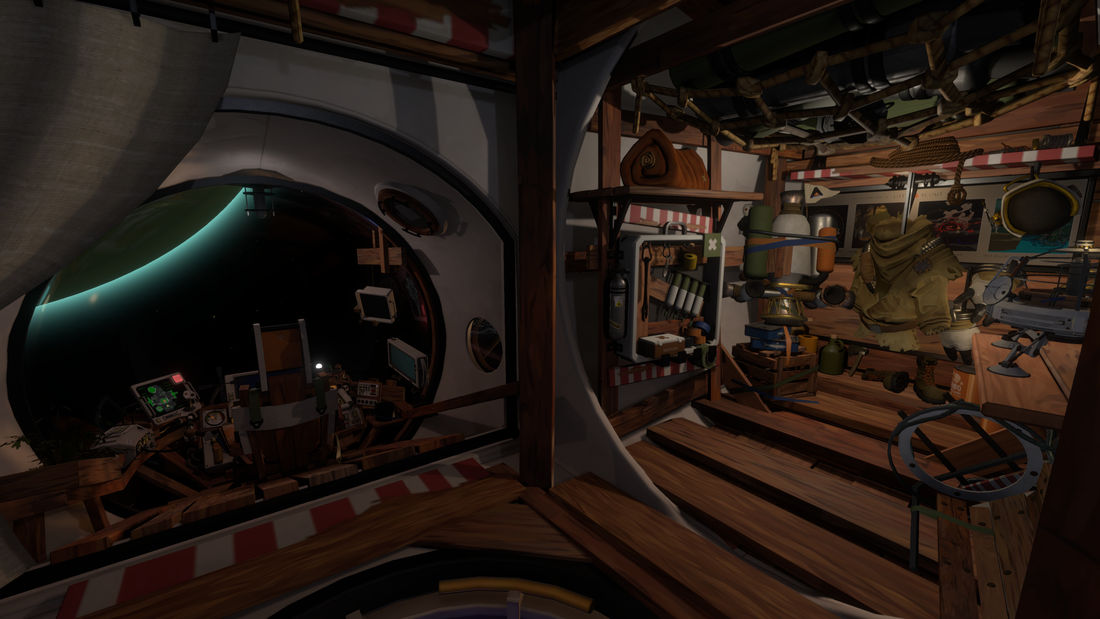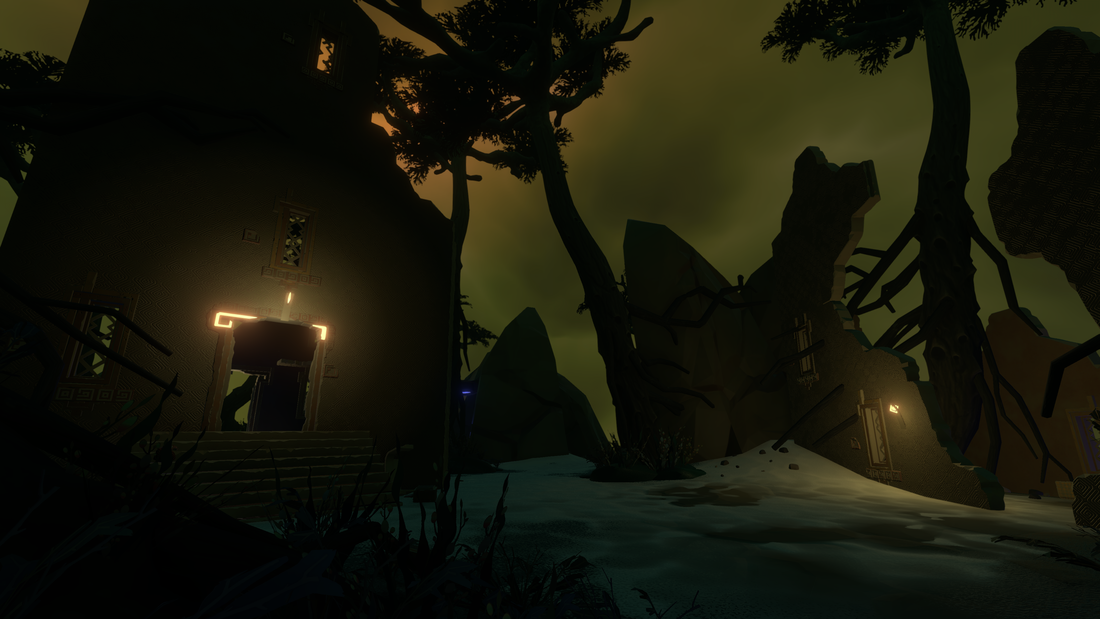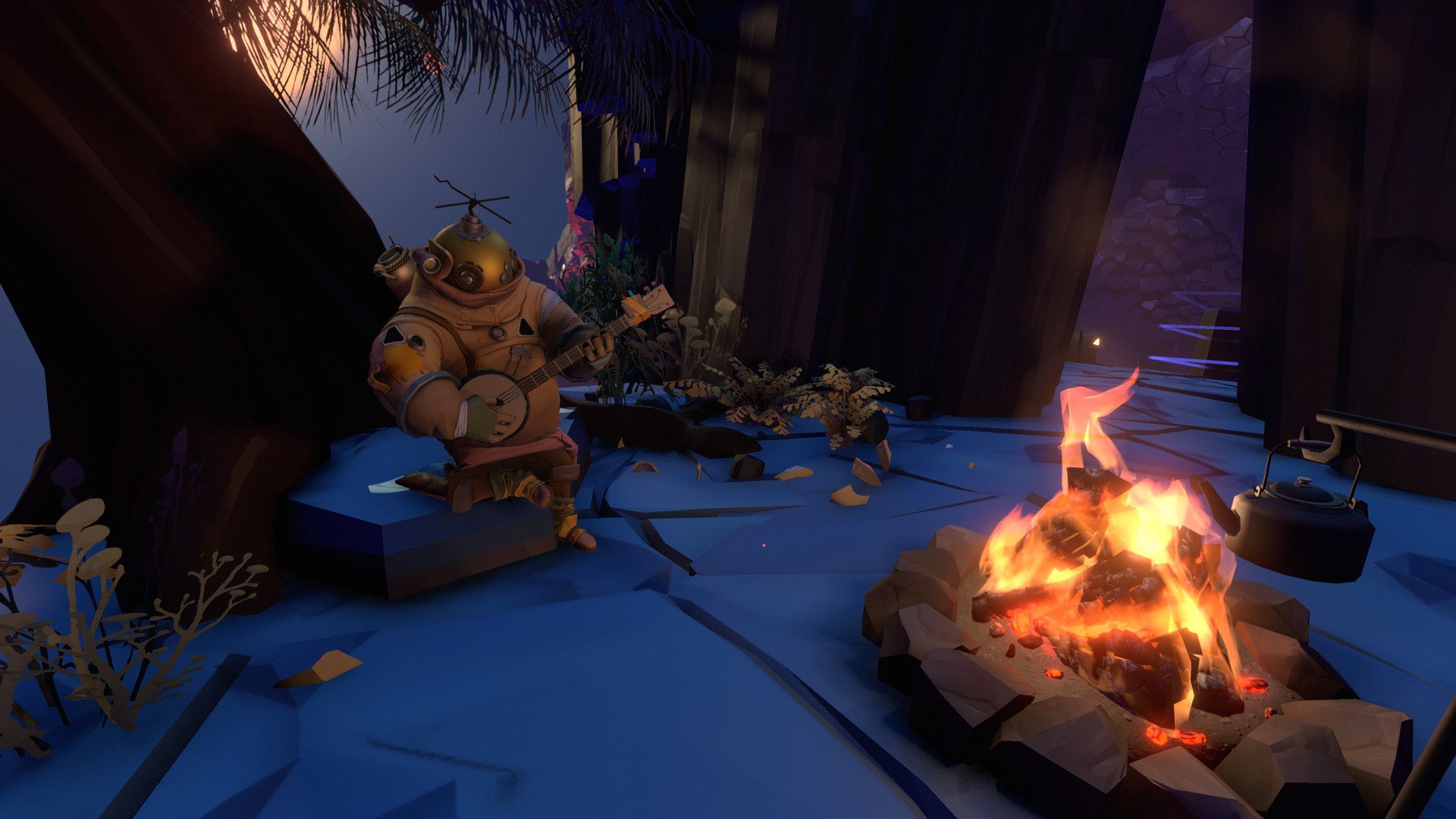Editor's Note: mild spoilers for Outer Wilds concepts are present in this editorial. Specific details and plot elements are kept as vague as possible, but but this is a game best experienced blind. Exercise caution before reading, but do play the game first and come back to this editorial after. It's worth your time.
Had I played Outer Wilds in 2019, it would inevitably have been in my recent Top 10 list. A safe estimate would probably be that it would be #4, since it didn't impact me quite as much as Disco Elysium, but I digress. What I'm saying is that Outer Wilds is an excellent video game, and I'm glad that I got the chance to tackle it recently.
Now, I would absolutely like to spend the rest of this article gushing about specific parts of Outer Wilds that I liked, including hugely interesting moments or revelations...but I won't. Much of the charm and fascination that I had with Outer Wilds came from solving its mysteries entirely on my own. It might not be like that for others, but figuring things out entirely from a smattering of clues or acting on unspoken cues was a huge highlight for me.
You begin Outer Wilds by waking up on your home planet of Timber Hearth, staring up at the stars. You're about to launch on your first space flight, and the opening section serves as a tutorial for many elements of the game you'll come to experience. One big story beat happens, and then you will launch into space. At this point, freedom is yours! Anywhere you'd like to go in the solar system is completely open to you, once you've come to grips with the flight systems. You'll never get any more tools or permanent upgrades beyond what you start with: the Scout Launcher, Signalscope, jetpack, and your spaceship.
The NPCs will offer a couple of basic suggestions: take a practice trip to the nearby moon? Or perhaps you'd like to meet up with the other explorers from Timber Hearth for tips and advice? The choice of actions you take is yours...up until the Sun promptly goes supernova after 22 minutes, ending all life in the solar system. Yes, that includes yours. After that, you begin once again on Timber Hearth, waking up and staring at the stars. Your ship computer carries over any points of interest or notes that you discovered, but that's it. Time to do it again...and again...until you start figuring out what is happening and if this abrupt ending to the universe could possibly be prevented.
A Riddle, Wrapped in a Mystery, Inside an Enigma
What follows for the duration of Outer Wilds is a rhythm of learning the workings of the solar system. Each planet offers a set of unique challenges, and solving them will reveal more parts of a bigger mystery. A precursor race left behind traces of many interlinked science projects, and their notes will frequently reference other places or experiments taking place on wholly different planets.
It struck me fairly early on that the only thing I was doing to progress was simply furthering my understanding of the game's mechanics and setting. This is hardly a unique case, but Outer Wilds is extremely hands-off in letting the player solve this system-sized puzzle. You can't make the puzzles easier by upgrading your jetpack or oxygen tanks. Ship upgrades to withstand hazards don't exist. There's no weapons, and any hazards you find just have to be navigated around.
From beginning to end, I was driving the entire experience forward. A mystery laid before me, expertly crafted and divided into several different information clusters that organically flowed between each other. It became a massive web of science fiction intrigue, and I just had to keep going and see it through to the end. There was always that timer in the back of my mind, yet death by supernova or other hazard was but an inconvenience...and other times, a hasty reset was exactly what I needed to catch a window of opportunity.
A single loop was rarely the same. Sometimes I'd try to act on a hint I'd picked up along the way, only to be missing something crucial to aid my understanding. I'd hurtle into the side of cliffs by accident, park my ship in a place that saw it ejected into space without me, or overestimated distances and run out of oxygen in a cave somewhere. Perhaps I'd uncover a clue about a timed event that would happen ten minutes earlier in a loop, so I'd close out the remaining time by attempting to jetpack to the next planet over. Sometimes, the music would start to signal the end of the loop, and I'd just wait it out by watching the end.
And in some loops...I'd just explore, or try different things without aim. How close could I skirt to the sun to gravity slingshot away? How far out of the system could I make it? Outer Wilds would sometimes possess the atmosphere of a horror game, leaving me tense as I raced against the clock to accomplish some objective I had set. But on other loops I was far more relaxed, just taking in the environment or experimenting with the mechanics further. Having the fear of death and significant consequences removed was relaxing; I could just enjoy and find the unspoken objectives at my own leisurely pace.
Closing the Loop
There is an ending to Outer Wilds, mind you. The mystery does eventually unfold, and a conclusion is reached. I overcame one final loop, fraught with danger and even the threat of permanent consequences this time around. But eventually, all the puzzle pieces were in place, I watched the ending, and I was able to roast a marshmallow one more time before the credits rolled. The sensation was...bittersweet. Finishing the game was an accomplishment, and I'm proud that I managed to reach it. But there's a pervasive knowledge now that will forever color any attempts that I have to play Outer Wilds again. You can never go back to the first time...we can never experience those same sensations again.
The pervading knowledge is mechanical, also. All the tools and trinkets available from the start will carry you through to the end; what changes is simply the understanding of what you can accomplish with them. Some clues are less about the game's core mystery, and more hints as to entire laws of physics. One simple sentence in the game -- which I won't spoil -- absolutely blew my mind once I processed the practical implications. Subsequent "Ah-hah!" moments of the game felt like major triumphs the likes of which I so rarely experience in games nowadays.
This brings us neatly to the core element of what works so well in Outer Wilds: emergent gameplay design. At no point did the game do anything more than nudge me out into the solar system. I could go anywhere, do anything, and act purely on self-motivation and curiosity. Everything I needed was right in front of me from the outset, but my willingness to play with the systems and explore lead to massive revelations and ramifications. Even stumbling through the tutorial has a looseness to its structure. Hell, revisiting that opening section later in the game made me really just how many future clues had been hinted at there, hiding in plain sight.
I play a significant amount of RPGs; grinding experience, gathering stronger equipment, and attaining incremental upgrades to overall power is familiar territory to me. There's objectives to complete, requests to answer, rewards to attain, achievements to grind...as much as I quite enjoy these gameplay loops, it can truly start to become a little too structured. Some games end up feeling too much like busywork and maintenance.
[pullquote]"You can never go back to the first time...we can never experience those same sensations again."[/pullquote]
But without that kind of gameplay hook, many players might feel lost or overwhelmed. What's our next step? What must we do from here? If I can't best this challenge, what can I do to ease future attempts? Abandoning these essential questions and leaving it up to the player to craft answers is a bold move. It's to the absolute credit of Mobius Digital that Outer Wilds managed to pull this off with such aplomb. The preservation of the ship log, the marker within if there's a remaining clue, and a handful of audio cues are all the guidance you'll be receiving. There's no mechanical benefit to completing anything; your reward is writing to read, and knowledge for future loops.
Even games of an exploratory, free-form nature tend to fall back on markers and progression systems. Minecraft has a progression system through various equipment tiers, assuming you don't just take to Creative Mode and build things. Breath of the Wild is large and rewards exploration with unique vistas, but also tangible rewards of shrines or Korok seeds.
Unspoken Player Guidance
Strangely, the game that I most liken to Outer Wilds is Super Metroid. Landing on planet Zebes in Super Metroid, Samus is isolated. The atmosphere is oppressive, despite your weapons and abilities. But the opening sections of the game are a masterclass of game design. Super Metroid subtly guides the player to their first handful of upgrades, encouraging them to figure out what they can do with subtle prompts, and then set the tone and stakes as its once dead world starts to come alive around you.
From landing on the planet to the first boss, the only instruction or line of text given is how to swap weapons to missiles. Everything else is inferred by the player as they descend and then return from that quick expedition. This trend holds throughout all of Super Metroid, keeping guidance and lessons vague as you navigate the planet. But always, there's cues in how the levels are designed or laid out that encourage you onward. Even the most advanced concepts like wall jumps and Shinesparking is conferred not by text, but by seeing friendly creatures do something similar, and then mimicking their actions.
It's this kind of non-vocal discovery and guidance that both Outer Wilds and Super Metroid excel at. Laying out a world and systems at the player's feet, the onus is on you to explore it. Objectives must be uncovered first, and then achieved. Allowing the player to come to grips with gameplay systems, but not explicitly telling them? That creates massively impactful moments once they're discovered. This subtle, unspoken game design is far more difficult to accomplish, but the fact that Outer Wilds managed it continues to impress.
[pullquote]"Subtle, unspoken game design is far more difficult to accomplish, but the fact that Outer Wilds managed it continues to impress."[/pullquote]
Now, I don't intend to conclude this write-up by saying that all direction or explicit instruction in games is bad. I like RPGs too much to champion eschewing all progression systems. Nonetheless, Outer Wilds took a chance with its design: here's a ship and basic tools, now go forth into this solar system! Live, die, repeat, over and over and over again...no progression systems, checklists, or clearly delineated objectives; just a solar system filled with curiosities and a mystery at the centre of it. Knowledge and understanding is all you'll take with you on your next attempt, and it's all you truly need to make it through.
Player-driven emergent design is a rare thing to behold in a game as well-curated and constructed as Outer Wilds. I didn't expect to love it as much as I did, yet I've only come to appreciate it more as I wrote this. Once I watched the recent Noclip documentary on the game's development, I was even more impressed with the design principles that went into it. Games that demand your time and constant attention are increasingly prevalent, so something hands-off and indirect was a breath of fresh air that I didn't know I'd need. Any confusion generated by Obsidian's similarly-titled game are unfortunate, but Outer Wilds is surely worth your time for a player-driven experience. Also, you should go play Super Metroid. It's real good.

